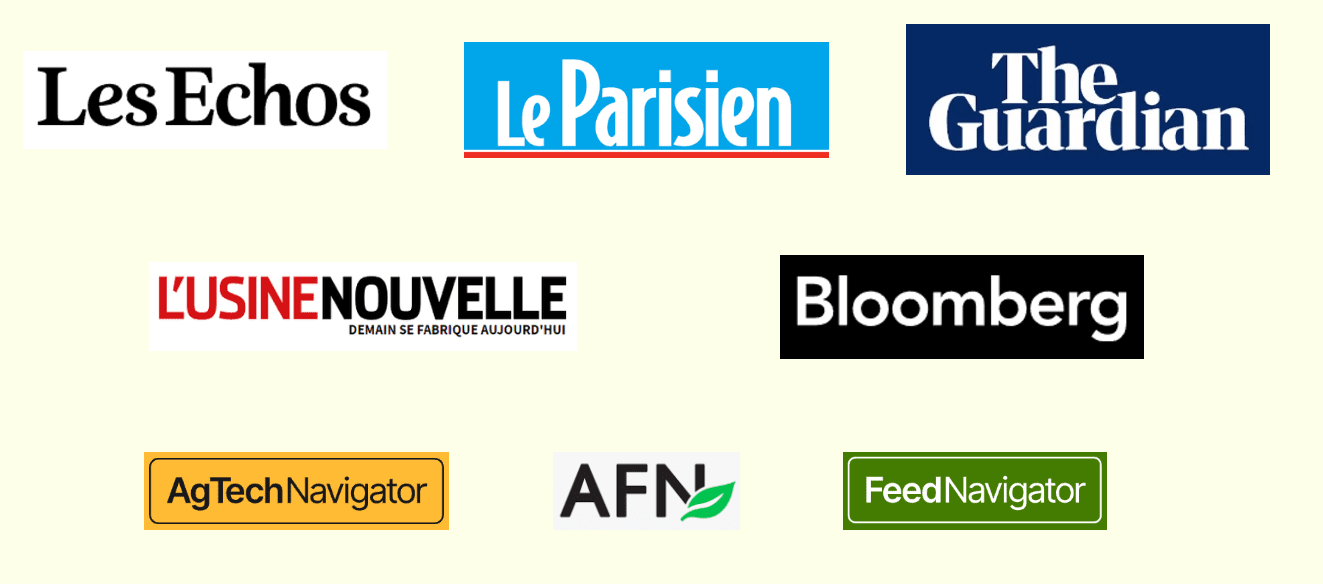Summary (TL;DR):
- Despite being promoted as a sustainable protein source, recent peer-reviewed research by members of the French National Observatory on Insect Farming (ONEI), in collaboration with the Insect Institute, reveals significant economic and environmental challenges.
- Most farmed insects are used for animal feed and pet food, supporting conventional livestock farming and aquaculture rather than replacing it, diminishing the expected sustainability benefits.
- One study we found indicates that insect-based products emit two to ten times more greenhouse gasses than traditional pet foods.
- We recently published several media articles on insect farming, with an op-ed published in one of France’s top newspapers, and our research was mentioned in The Guardian and Bloomberg.
- ONEI, which we represent, is the only organization dedicated to providing evidence-based information on insect farming's impacts, aiming to inform policymakers, investors, and journalists in France, global leader of the sector.
- We are fundraising to expand our research and outreach efforts, including hiring our second full-time employee. You can donate here if you think additional work on this topic is important!
Here’s the list of newspapers that mentioned our research
Challenges and Impacts of Insect Farming
The insect farming industry has experienced immense growth in recent years, attracting about 1.5 billion dollars in worldwide investment. As a measure of this growth, the number of insects farmed annually has increased sevenfold in just five years, increasing from about 1 trillion in 2020 (this is a rough estimate that will be updated). France, where we are based, is a global leader in the sector, hosting two of the largest companies. The French government is actively supporting this industry through funding and research.
While insects were initially hailed as sustainable for their potential to replace meat, insect-based meat substitutes now constitute a negligible part of the market. Instead, farmed insects are predominantly used as feed for other farmed animals like fish and chickens, thereby supporting conventional aquaculture and livestock farming, or as pet food.
In collaboration with the Insect Institute, we have published several peer-reviewed papers highlighting the challenges faced by insect farming, revealing significant issues regarding its sustainability and economic benefits. You can find a summary of these challenges in our recently published op-ed below.
International Media Coverage
Our studies have been mentioned internationally:
- The Guardian: The Insect Institute published a letter titled Eating insects is not going to save the planet.
- Excerpt: "Instead of saving the world, insect farming mostly adds an inefficient and expensive layer to the food system we already have. Resources would be better devoted to alternative proteins such as plant-based or cultivated meats"
- Bloomberg: Featured our research in the article Can Bugs Be the Protein of the Future? New Study Casts Doubt.
Our Work at ONEI
ONEI (French: Observatoire national de l’élevage d’insectes) is a newly established organization dedicated to providing evidence-based information about the environmental and societal impacts of insect farming. Our mission is to inform and shape public discourse on the sustainability of insect farming through rigorous research and strategic outreach. We are the only organization in France committed to providing this kind of critical analysis, despite the rapid growth of the sector and significant public support.

What We've Achieved So Far
- Research Publications: We have published two peer-reviewed papers in collaboration with the Insect Institute:
- Three more papers are available as preprints on topics including:
- Media Presence: Our work has been featured in several newspapers, including:
- Le Parisien: The second most widely read regional newspaper in France.
- L’Usine Nouvelle: A prominent industry-focused publication.
- Educational Outreach: Through translations of scientific articles and popularization efforts, we strive to become the reference organization in France for any questions about insect farming. We also started outreach to decision-makers to share these results.
Support Our Work
We aim to continue conducting research and expand our outreach efforts. To achieve this, we are currently fundraising through Manifund, which is tax-deductible in the U.S. (we’re also tax-deductible in France).
Our goal is to raise $50,000 to hire a second full-time employee, specialised in communications, which will more than double our outreach capacity, and help alleviate our current largest bottleneck. We have a large list of contacts (journalists, investors) we haven’t been able to reach out to so far due to limited capacity. As we are a new organisation with limited funds, your donation can significantly help us provide a more evidence-based discourse on insect farming, including the significant challenges of the sector.
Visit the Manifund page for more details about us, our track record, and how we plan to achieve our goals: https://manifund.org/projects/national-observatory-on-insect-farming---onei.
Overview of the challenges identified with insect farming in our first op-ed
We provide an overview of the challenges associated with insect farming in our recent op-ed published in Les Echos, one of France's top five daily newspapers, widely read by policymakers and investors (check here for the sources). We think the full text adequately summarizes the issues we identified:
“Insect Farming: A Worm in the Fruit of French Innovation?”
The recent safeguard procedure undertaken by Ÿnsect, the leader in insect farming, highlights deep financial troubles and raises questions about the future of the sector in France. Since its founding in 2011, this symbol of French Tech has raised $600 million with substantial support from Bpifrance and the French state. However, last year, the startup was forced to lay off 20% of its workforce and close its Dutch factory.
The early days looked promising. A 2013 FAO report presented insect farming as a potential solution to environmental challenges linked to conventional livestock farming, which is recognized as a major cause of deforestation. France positioned itself at the forefront of this sector. However, recent studies, some co-authored by ONEI, reveal a much more nuanced reality.
Economically, the sector faces significant obstacles. Insect meal costs two to ten times more than conventional feed for livestock, creating a major barrier to adoption. Additionally, several major companies have recently encountered financial difficulties, highlighting the economic fragility of the model and increasing investor skepticism. Most companies in the sector face serious structural and technological challenges. Although certain innovations, such as genetically modified insects for faster growth, are under development, they are not yet available on a large scale.
From an environmental perspective, the initially advertised benefits should be toned down. Contrary to expectations, the use of food waste to feed insects remains limited, mainly due to logistical, regulatory, and health constraints. Most of these farms therefore use agricultural by-products based on grains, thus directly competing with conventional animal feed, or even human food, often resulting in a greater environmental impact.
The same applies to products targeting pet food, which accounts for more than half of the market. A 2021 study estimates that insect-based products emit two to ten times more greenhouse gasses than traditional pet foods, which are often made from slaughterhouse by-products.
The human food market is not more promising, as substituting meat with insects faces consumer rejection. Its market share is considered negligible. Compared to plant-based alternatives, which have grown significantly over the past decade, insects have much lower acceptability and a higher environmental impact.
In light of these setbacks, how can we not question the relevance of massive public investments in an industry whose long-term viability is uncertain? This is an industry that has benefited from INRAE's research and remains highly vulnerable to offshoring, which undermines its potential contribution to food sovereignty.
Other solutions offer more promising and less risky prospects for achieving our sustainability and food security goals, such as reducing animal protein consumption through support for research on plant-based alternatives.
Given the gap between the industry’s discourse and scientific reality, there is a concern that insect farming may be used as a greenwashing tool. Before continuing with massive investments, it is urgent to consider the economic realities: supporting this sector with public funds is a highly risky bet in the context of budgetary debt.
Get in Touch
- For more information about our work, visit ONEI's Website, where you can subscribe to our upcoming newsletter (in French).
- If you have any questions, feel free to reach out at corentin.biteau@onei-insectes.org, contact me on Linkedin, or engage in the comments below.
- If you are interested in volunteer opportunities in this field, please contact us. Even if you don't speak French, I can redirect you towards ways to have an impact.

